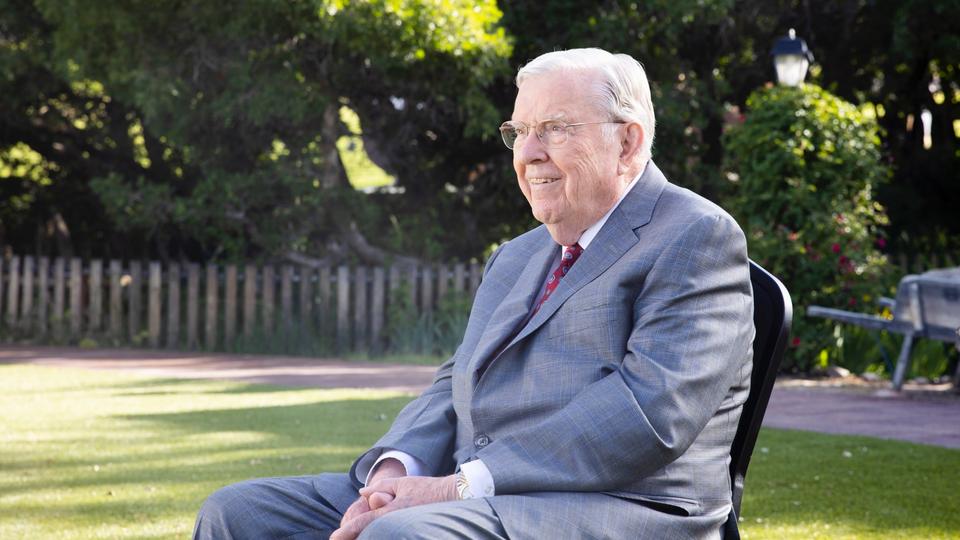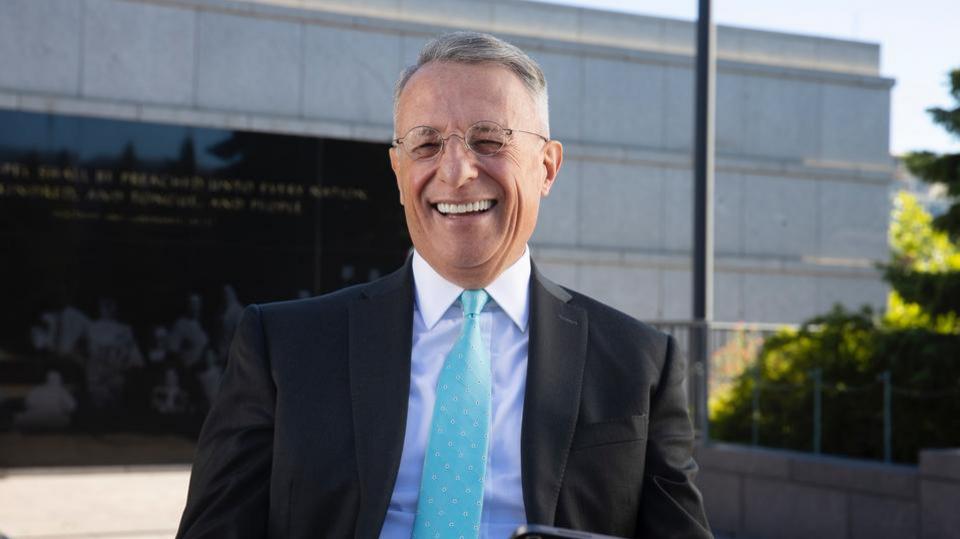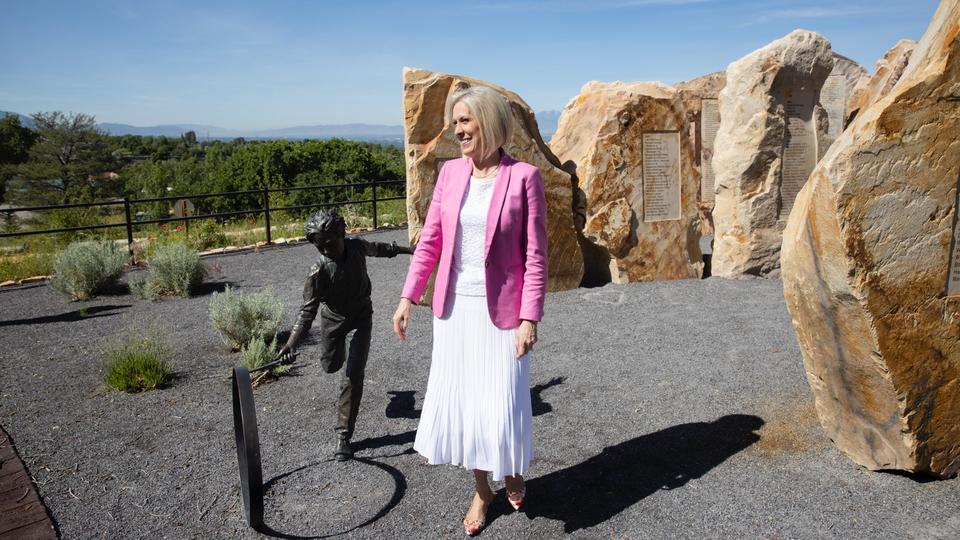(For Non-Muslims’ Use Only)
Each July 24th, Latter-day Saints in Utah and around the world celebrate Pioneer Day, an official holiday that the U.S. state celebrates to commemorate the first group of the faith’s pioneers that arrived in the Salt Lake Valley nearly 175 years ago.
Church Newsroom and other media outlets recently spent time with several of the faith’s leaders at This Is The Place Heritage Park and on the roof of the Conference Center in Salt Lake City, Utah, leading up to the Latter-day Saint-based holiday.
-
- Ulisses Soaresmural pioneiros
- Ulisses-Soares-pioneiro-1.jpg
- Ulisses-Soares-pioneiro-2.jpg
- Pioneer Day Reflections 9
- Ballard-Pioneer-1.jpg
- Ballard-and-Joy-1.jpg
- Joy-D.Joses-Pioneer-1.jpg
- Pioneer Day Reflections 11
| Temple Square is always beautiful in the springtime. Gardeners work to prepare the ground for General Conference. © 2012 Intellectual Reserve, Inc. All rights reserved. | 1 / 2 |
During the interviews, three of the global faith’s leaders — M. Russell Ballard, acting president of the Quorum of the Twelve Apostles; Ulisses Soares of the Quorum of the Twelve Apostles; and Joy D. Jones, Primary general president— shared their thoughts on the importance of honoring the Church’s pioneer heritage, recognizing modern-day pioneers regardless of their nationality, and offering guidance on how Saints around the world can create their own legacies.
President Ballard: “We have a great story; we have the great pioneer story”
“Not everybody is a descendant of a pioneer that made their way across the plains in the valley,” said President M. Russell Ballard, senior apostle of the Quorum of the Twelve Apostles. “But all of us have forefathers, and regardless of our nation, culture, and where we come from … we all have pioneer heritage.”

Russell-Ballard-PD6.jpg
President M. Russell Ballard, senior apostle of the Quorum of the Twelve Apostles, is interviewed by Church Newsroom and other media outlets in front of Mary Fielding Smith's (his great-grandmother's) home at This Is The Place Heritage Park on Monday, June 15, 2020, in Salt Lake City, Utah. President Ballard is a direct descendant of Hyrum Smith, the brother of Joseph Smith, founder and first president of the Church.© 2020 by Intellectual Reserve, Inc. All rights reserved.President Ballard, a Salt Lake City native, is also a direct descendant of Hyrum Smith, brother of Joseph Smith, founder and first president of The Church of Jesus Christ of Latter-day Saints.
“My mother is a Smith. So, Joseph F. Smith (Hyrum’s son) was her grandfather. He’s my great grandfather,” said President Ballard. “When he was only 7 years old, he was the wagon master of one of Mary Fielding Smith’s children.”
Joseph Fielding Smith, who went on to become the Church’s sixth president, joined his family and thousands of other Saints as they made their way from Illinois to the Salt Lake Valley, a journey of 1,300 miles (2,100 km), to escape religious persecution.
An estimated 60, 000 to 70,000 pioneers organized in companies and traveled by wagon or handcard to Utah between 1847 and 1868.
“When you read that history and think about what they went through, them and others who pulled handcarts, and others who just walked all the way, my oh my,” exclaimed the 91-year-old apostle.
“When we celebrate Pioneer Day, we ought to be cheering for those who led the way to everything that we have in this great valley,” continued President Ballard.

Pioneer Day Reflections 9
A statue of Mary Fielding Smith next to what used to be her home at This Is The Place Heritage Park in Salt Lake City, Utah, on Monday, June 15, 2020. During an interview about Latter-day Saint pioneers, President Ballard explained that women played a vital role both in the trek westward then and in future pioneer legacies. 2020 by Intellectual Reserve, Inc. All rights reserved.Describing his pioneer heritage while sitting in front of his great-grandmother Mary Fielding Smith’s home and near a statue dedicated to her memory in This Is The Place Heritage Park, President Ballard explained that women played a vital role both in the trek westward and in future pioneer legacies.
“You get reading and studying that history, and you start to study greatness. You study faith, love of the Lord, connection to the Lord,” he said.
“Without that, they never would have been able to do what they did,” added President Ballard. “Thank you, Lord, for the great women of the world!”
In addition to the physical hardships that pioneers faced while making their way to a new home in the west, the senior apostle noted that early Latter-day Saints stumbled across other types of challenges on their journeys.
“Nobody is perfect; they weren't perfect,” said President Ballard. “But I would say, as they suffered, as they made their way, and as they learned to know God and to know the Lord Jesus Christ through their faith in their prayers ... they then became stronger spiritually.
“The pioneers learned some great lessons by the mistakes they made,” said President Ballard.
He pointed out that people today have much more in common with them than they think.
“That’s the quest that all of us have,” said President Ballard. “We're trying to become better people.”
Leading up to Pioneer Day commemorations, President Ballard emphasized that all Saints can draw a connection to the sacrifices made by past generations of Latter-day Saints.
“Wherever people live, there are our forefathers who were pioneers,” he said. “And when you think about how the gospel of Jesus Christ went out in the world and those people that accepted it, they became pioneers in their own countries, in their own way.
“We have a great story; we have the great pioneer story,” said President Ballard.
Elder Soares: “Every member of this Church is a pioneer”“I first started learning about the pioneers' legacy when I was a seminary student in Brazil many years ago,” said Elder Soares, when asked what he knew about the Latter-day Saints who made their way across the plains to Utah, before he began living in the United States.

Ulisses-Soares-pioneiro-3.jpg
Ulisses Soares, do Quórum dos Doze Apóstolos, sorri enquanto responde à pergunta de um jornalista na terça-feira, dia 23 de junho de 2020, em Salt Lake City, Utah. Durante uma entrevista sobre o Dia dos Pioneiros, o élder Ulisses Soares disse que independentemente da nacionalidade dos santos dos últimos dias, cada membro da Igreja é um pioneiro moderno e pode honrar o legado pioneiro.© 2020 by Intellectual Reserve, Inc. All rights reserved.“I was really inspired by their courage,” he added.
Called as a member of the Quorum of the Twelve Apostles in March 2018, Elder Soares is from São Paulo, Brazil.
Since then, the global faith leader explained that his new assignment as a church apostle exposed him to increased learning opportunities and more appreciation for Latter-day Saint pioneer history.
“My respect and admiration for the pioneers’ legacy has grown a lot since I moved here to the United States,” said Elder Soares.
Even though time has passed, Elder Soares added that modern-day Saints are tasked with a special responsibility.
“Pioneers in the church have left a great legacy to us new generations, and we have to continue it through our service,” he said. “It reminds me of the teachings of the Savior when He said, ‘By their fruits, you shall know them,’ because the pioneers' fruits are very good.
“There are many people suffering these days,” said Elder Soares. “Our smile, our service, our extended arms can really show them the love the Savior has for them. … I think that's the best way to honor the pioneer heritage.”
Although Pioneer Day is celebrated as an official holiday in Utah, the Brazilian apostle noted that modern-day Latter-day Saints are pioneers in their own way, wherever they live.
“Every member of this Church is a pioneer,” he said. “No matter if they're here in the United States or in Brazil or in Asia or Africa.
“Each new convert is a pioneer because he's paving the way for their future.”
According to Elder Soares, he has received many good things as a result of the sacrifices that Saints from his home country, who lived before him, made.
“The pioneers in Brazil mean a lot to me because they paved the way for me,” said Elder Soares.
“I am the recipient of the blessings that they, through their example, blessed me [with],” he said. “I am so grateful for them, for their influence on me, for their efforts to teach me, to help me.”
Elder Soares recalled when he was a young boy attending church in Sao Pãulo, with very few congregants. Today, Brazil is home to nearly 1.5 million Latter-day Saints.
“We had these great leaders. They were converts of the Church that made tremendous changes in their lives,” he said.
“They helped us to see beyond our eyes; they helped us to see our future. I owe much of what is happening today in my life to these wonderful people,” Elder Soares added.
The global faith leader explained that even though Brazilian Saints and other members of the faith do not celebrate pioneers on a specific date like they do in the U.S., their legacy is mentioned often, specifically when new congregations are organized and sacred buildings such as temples and meetinghouses are dedicated.
“I don't celebrate as a descendant of a pioneer from Utah. But I do celebrate as a descendant of a Latin pioneer,” he said.
Sister Jones: “They relied on Jesus Christ and today, as modern-day pioneers, we rely on Him”
“We get so busy in the present and we're always looking forward to the future, but sometimes we forget to look back,” said Sister Joy D. Jones, Primary general president of the Church.

Pioneer Day Reflections 5
Joy D. Jones, Primary general president, walks through This Is The Place Heritage Park and next to a monument dedicated to pioneer children on Monday, June 15, 2020, in Salt Lake City, Utah. Sister Jones is president over the Church’s worldwide primary program that serves more than 1 million children.2020 by Intellectual Reserve, Inc. All rights reserved.“Sometimes we forget to remember. And yet, we build upon all of the things that were done in the past and all of those wonderful people who sacrificed so much,” she said.
As president over the Church’s worldwide Primary program that serves more than 1 million children, Sister Jones expressed her assurance in the vital role that adults play to help young ones understand and develop the qualities that early pioneers demonstrated while making their way to the western United States.
“We can live the characteristics that we so honor and respect in our early Saints: courage and faith, love, resilience and that strength that they exuded every day of their lives, one day at a time,” said President Jones.
“As we live those characteristics, we are sharing those things with our children, we’re exemplifying them,” she added.
Sister Jones said that in addition to setting an example for children, adults should teach their young ones about their family history.
“As children understand their families … they're stronger and they're more resilient. They're more grounded.
“They realize that they're part of something bigger than themselves — that they have an important place and an important role to play,” she said.
During the migration of Latter-day Saints from Nauvoo to the Salt Lake Valley, hundreds of minors accompanied their Latter-day Saint families who trekked the westward trails.
A Church History page that expounds on Latter-day Saint pioneers’ emigration in the mid-1800s says members of the faith who lost their lives suffered from illnesses common to the time period, including cholera and dysentery.
Other risks included accidents along the trail, such as being run over by wagons or being stampeded.
At This Is The Place Heritage Park, a monument is dedicated to more than 650 children who lost their lives on their way to Utah.
“Perhaps today's children won't face challenges of that same sort, but they will face challenges as well,” said Sister Jones. “And our children can look at those children and realize it was hard for them — they did hard things.”
Sister Jones shared that her great-grandmother Helen was born on the pioneer trail, 10 days before her parents came into the Salt Lake Valley, in the back of a wagon.
“That was her beginning, and she grew up working hard, sacrificing much, but something that stood out to me was her example when she was 15 years old,” said Sister Jones.
She described how Helen took care of her own mother daily because of her poor health. As a result, Helen raised her nine brothers and sisters.
“I just marvel at the things that she accomplished, and I think today, ‘Her DNA is in me, I can do hard things, too,’” said Sister Jones. “I can't imagine the travel that they experienced.”
Sister Jones explained that when people choose to face challenges with faith, “We can reach out to others, we can serve those around us as they did and we can rely on our Savior Jesus Christ, just as they did.
“The early pioneers relied on the Savior … and today, as modern-day pioneers, we rely on Him,” she continued.